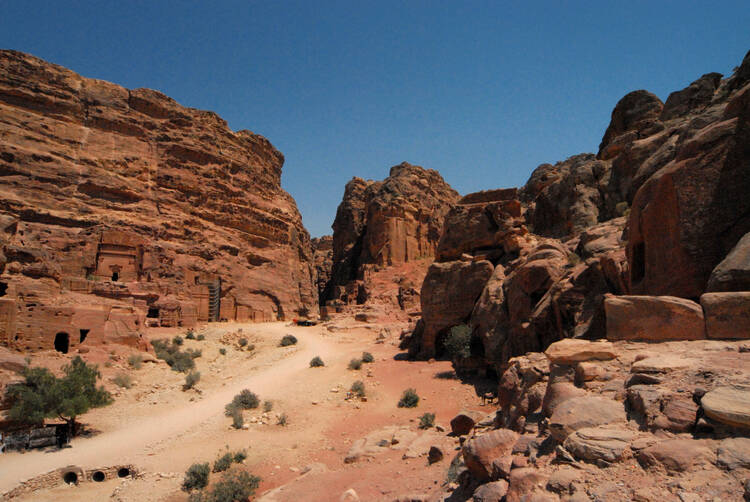A Reflection for the Memorial of Saint Philip Neri, Priest
By Ashley McKinless
Find today’s readings here.
He said to him the third time,
“Simon, son of John, do you love me?”
Peter was distressed that he had said to him a third time,
“Do you love me?” and he said to him,
“Lord, you know everything; you know that I love you.”
Jesus said to him, “Feed my sheep” (Jn 21:17).
I came to today’s readings with a new appreciation for sheep, specifically the lost ones.
I recently visited a friend who lives in Amman, Jordan, and we made a trip to Petra, the ancient hidden city of “Indiana Jones and The Last Crusade” fame. There are two ways to see the “Monastery” and the “Treasury,” breathtaking monuments carved into the canyon walls in around the first century A.D. The first is straightforward: Park at the visitors’ center and follow the crowds into the wadi (i.e., canyon) and follow the same path back out. But, I was told, the locals know that the better way is to have a taxi drop you off on the side of the highway and to hike to the Monastery through the back entrance. We chose the latter, and we chose poorly.
We started our hike at noon (again with the poor choices). We were instructed that it would be about a 40-minute hike to the stairs that would lead us to the Monastery. After a two-hour trek through a canyon valley with no clear path, we had to admit we were lost—with low battery, no service or map and one bottle of water left. I was scared.
The image of God as a merciful shepherd is a comforting one. Remembering that we are at times the lost, helpless sheep? Harder to sit with but just as true.
We try to retrace our steps, only to find unfamiliar terrain. Then, on our second attempt, we see in the distance a shepherd. An honest-to-God Bedouin shepherd leading his sheep and goats. When we tell him our predicament, he not only points us in the right direction but walks with us all the way to the Monastery, more than an hour’s journey.
I realize this might sound a bit on the nose. I was a lost sheep—saved by a shepherd! But getting lost in the desert, hardly a metaphorical experience for Jesus’ first disciples, gave me a visceral understanding of the Gospel that can be hard to access from my comfortable perch in the modern Western world.
Today’s Gospel from John centers on Peter’s rehabilitation and his new role as the chief shepherd of the church. But while the passage concerns Peter, Jesus seems more concerned about the fate of his sheep. Three times Jesus says: Feed my lambs. Feed my sheep. No, really, feed my sheep. I imagine Jesus getting a little nervous as he prepares to hand over the keys to his vicar on earth, not only because he knows Peter’s flaws but because he knows how easily we wander off the narrow path—and how much we need his guidance.
Admitting to that radical dependency does not come naturally to me. Air conditioning, food delivery apps, Google Maps: They all make it easy to forget that we rely on nature, community and God for our well-being, physical and otherwise. Experiencing our vulnerability can shake us out of that complacency and help us hear the Gospels how they would have been heard 2,000 years ago. The image of God as a merciful shepherd is a comforting one. Remembering that we are at times the lost, helpless sheep? Harder to sit with but just as true.








